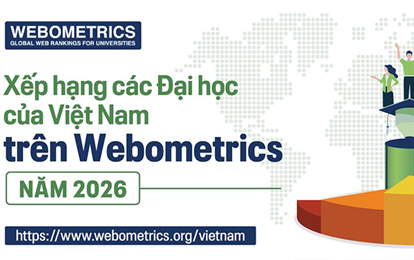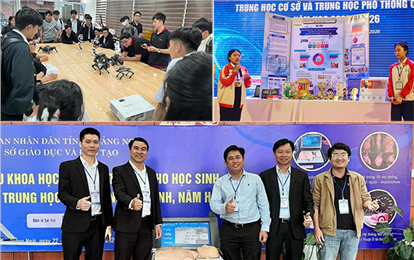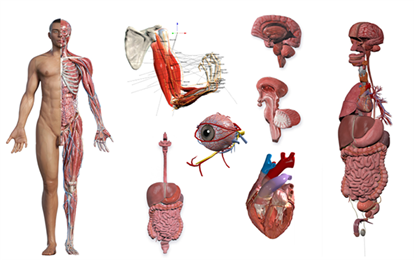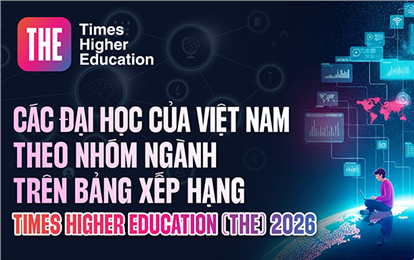Undergraduate
DTU offers from 4 to 7 credits in AI and Entrepreneurship for all students
DTU has officially announced a comprehensive restructuring of its training programs to include mandatory training in Artificial Intelligence (AI) skills and Entrepreneurship knowledge for all undergraduate students, starting with the incoming K-31 cohort (academic year 2025 - 2026).
For current students enrolled in earlier cohorts, the university will also gradually integrate AI and Entrepreneurship skills and knowledge into their lessons to ensure they are fully equipped to enter the future job market later on.
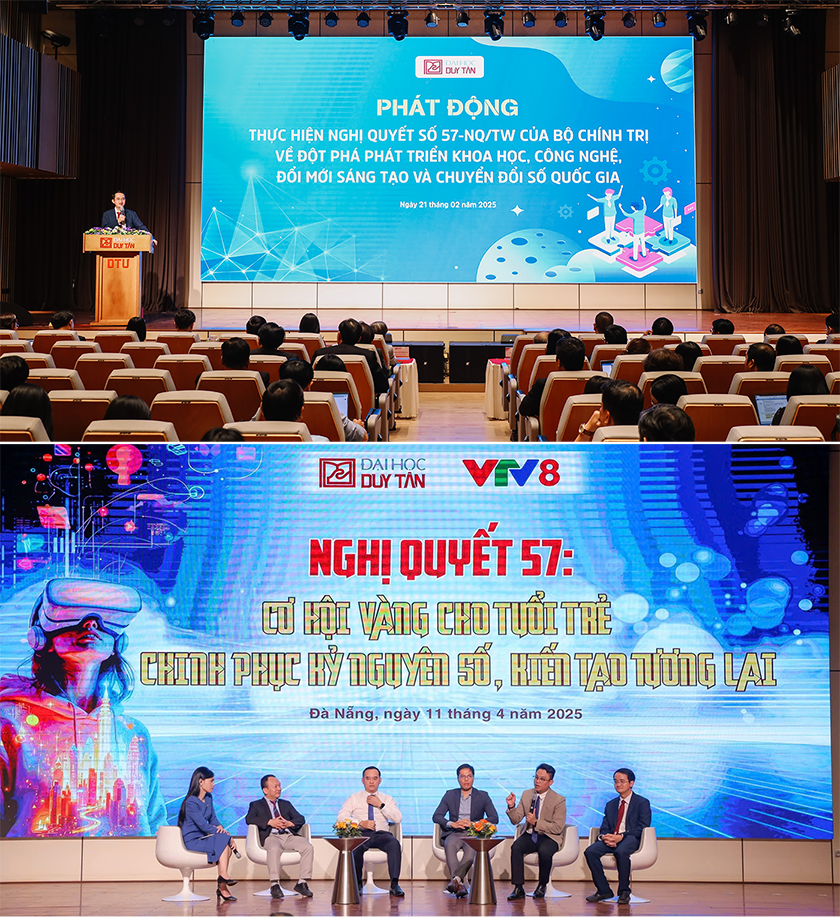
DTU launches the Implementation of the Politburo’s Resolution No. 57-NQ/TW
(photo above) and holds the seminar “Resolution 57: A Golden Opportunity for Youth to Conquer the Digital Era and Create the Future” (photo below)
DTU is not only integrating Artificial Intelligence (AI) into specialized courses whenever possible but also comprehensively restructuring its training program to incorporate AI. The current curriculum planning includes three mandatory AI credits for all students, with the possibility of adding from one up to a maximum of three specialized AI credits depending on each training major.
This program is designed to span the entire university journey, ensuring continuity, practicality, and suitability for each field of study. The goal is not only to equip students with basic AI knowledge but also to make AI an indispensable part of their professional mindset.
The three mandatory AI credits include:
- 1 credit on basic AI skills applied in daily life and academic activities;
- 1 credit on AI skills and knowledge specific to the group of majors;
- 1 credit on essential AI competencies for each major, which may include computational skills and programming in Machine Learning and Deep Learning.
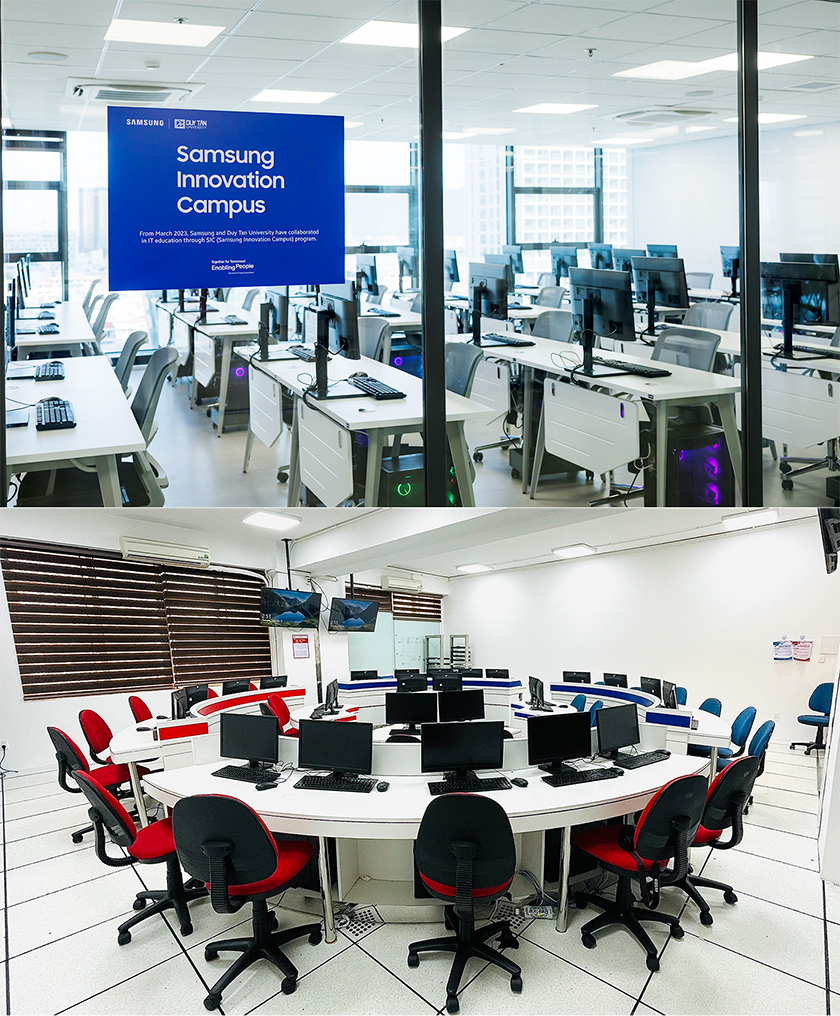
Modern facilities fully supporting IT and AI education at DTU
Specifically, with the first AI credit taken during the freshman year, students will be introduced to core concepts, the development history, and the potential applications of AI across various fields. Beyond theoretical knowledge, students will practice essential academic AI skills, conduct scientific research supported by AI, summarize learning materials, and professionally design and present reports or projects. Popular AI tools such as ChatGPT, Grok, Notion AI, Gamma/SlidesAI, and others will be integrated into the lessons. Additionally, ethical considerations in AI usage will be introduced.
For the next AI credit, the training content is customized to fit the characteristics of each major group (represented by schools or members within the DTU):
- Students in Technology & Engineering will explore how to use AI in automated programming, source code analysis, and designing intelligent data systems.
- Students in Economics, Management, Finance & Services will be introduced to AI tools for market data analysis, consumer trend forecasting, risk assessment, and automating marketing, organizational, and financial reports.
- Students in Languages, Social Sciences & Humanities will access AI tools for natural language processing, social behavior research, and creative content generation such as writing prose/poetry, translation, and analyzing statistical, cultural, and legal data.
- Students in Medicine & Pharmacy will be trained to use AI tools to maximize learning efficiency under the Evidence-Based Learning (EBL) model; develop skills in automated patient data analysis, support medical diagnosis, and assess risks in medical decision-making.
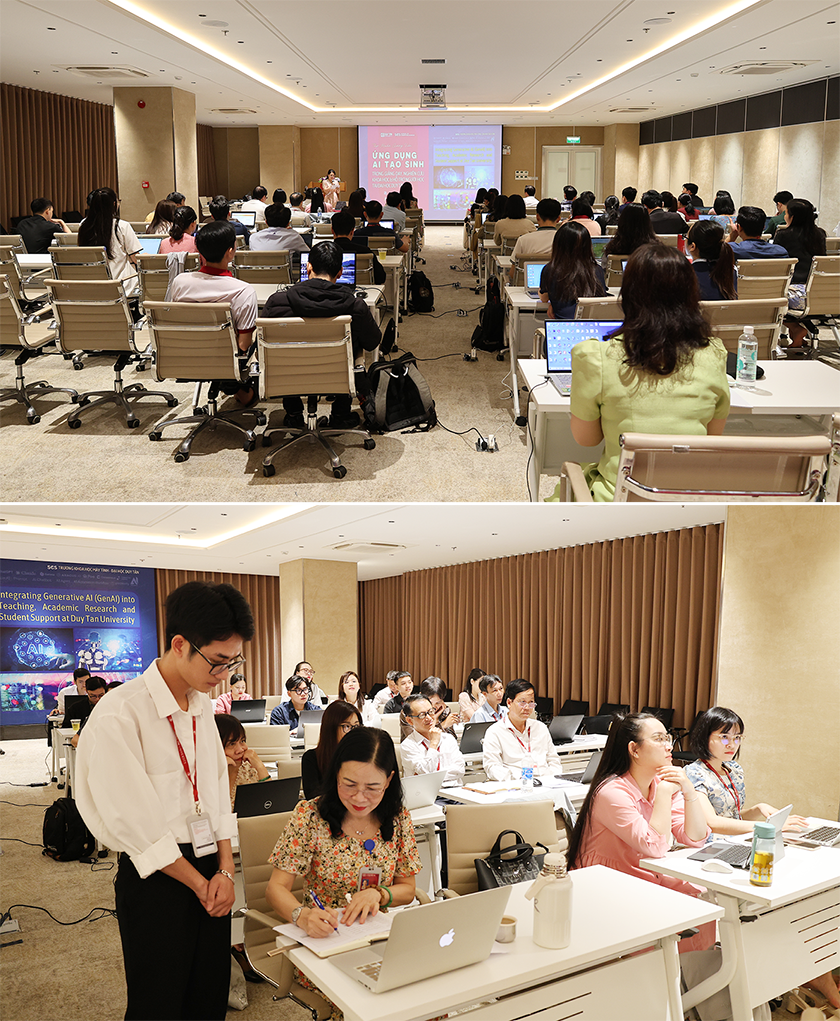
DTU organizes training course on applying AI technology in teaching, and scientific research for all staff and lecturers
The final mandatory AI credit will focus on advanced AI topics, where students apply AI directly to their own fields of study. For example, Graphic Design students will use tools such as Runway, Midjourney, or Adobe Firefly to automatically create videos, develop creative graphic ideas, and design brand identity systems. This practical approach helps students in each major not only master common AI tools but also learn how to generate creative value in their future careers.
All three mandatory AI credits are taught directly in classrooms and labs, while AI content integrated into existing courses may be delivered through online learning or microlearning formats.
Dr. Tran Nhat Tan, DTU Vice-Provost, emphasized: “We do not just teach AI as ordinary subjects; we aim to build AI competency as a core foundation, helping students adapt, innovate, and lead in the digital era.”

Collaboration with leading IT enterprises brings AI learning opportunities to DTU students
The long-standing partnerships with prestigious international corporations such as Samsung, Alibaba, LG, Microsoft, Fore, and others have significantly enhanced DTU’s technological capacity in AI training and education. Notably, since 2023, Samsung has transferred two labs and three courses on AI, IoT, and Big Data through the Samsung Innovation Campus (SIC) project. In 2024, Alibaba Cloud Intelligence granted academic access on Alibaba’s cloud platform (AAEP) to DTU.
Meanwhile, a mandatory credit on Entrepreneurship at DTU is designed to align with the AI mindset of the new era: “Anyone can become an entrepreneur if they are skilled and flexible in using AI tools and applications.” The entrepreneurship training goal at DTU is not to produce technology “unicorns” but to cultivate a “unicorn spirit” within every student in the age of innovation and digital transformation.
|
- Computer Science & Information Systems: ranked Top 201-250 globally according to QS World University Rankings 2025 |
(Media Center)
Other News



